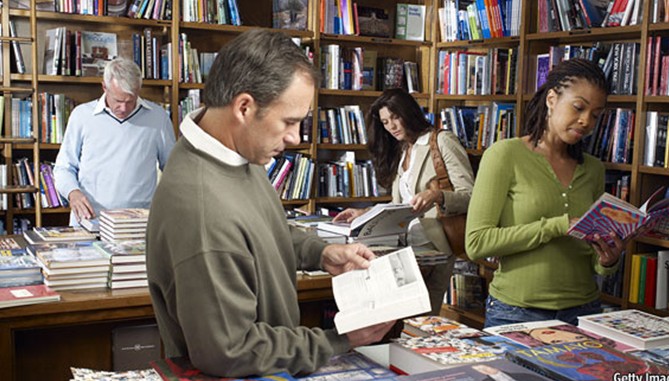
『电子商务时代的到来,以及电子阅读的逐渐普及,使得实体书店失去了许多生存的空间,人们不禁要问,纸质书籍将何去何从?』
Goodbye to bricks and mortar
向砖头似的纸质书告别
July 4th, 2011 | From The Economist

TO DESCRIBE the woes of bricks-and-mortar bookstores is to join the dirge-singing chorus. Everyone knows the tune: sales at bookstores have fallen because buyers are ordering books online or downloading them to e-readers. Bookstores may be great places to browse and linger, but online is where the deals are. In the latest chapter in the Borders saga, the bookstore chain has agreed to sell its assets for $215m to Direct Brands, a media-distribution company owned by Najafi. This will serve as the opening bid for the company’s bankruptcy-court auction, scheduled for July 19th.
Whatever happens at the auction will dictate the fate of the bookseller, which has already closed more than a third of its stores. Because Direct Brands is an online distributor of music, DVDs and books, some speculate that a deal with Najafi will do little to keep the remaining bookstores open. Rather, the company will probably see value in the Borders distribution network and liquidate most everything else. Regardless, the story doesn’t look good for store employees and their dwindling patrons.
Like Barnes & Noble, Borders has a reputation for being a brutish corporate behemoth that has been edging out more humane book-selling competition for decades. Isn’t this just a story of comeuppance? But as we noted in March, these colossal book empires have also played an important role as often lone bookstores in small American towns and suburbs, where readers may otherwise be limited to what can be found at Wal-Mart. A friend and former colleague who grew up in Texas often bristled when New Yorkers kvetched about stores like Borders. When one of these multi-storey bookstores moved into his home-town, he couldn’t believe his luck. Urban centres can be counted on to provide affable places to buy tomes, flirt with bookworms and listen to visiting authors. Elsewhere it is stores like Borders that have provided a rare, atmospheric and pressure-free space for bibliophiles, often in strip malls next to a Home Depot.
But alas, this precious “pressure-free” element may be the problem. Now that these bookstores are closing, local papers are lamenting the loss even as they profile customers who never quite managed to open their wallets. A recent article in the Elk Grove Patch, for example, considered the precarious fate of its local Borders bookstore—the only non-religious bookstore in the Californian city, just south of Sacramento. Yet the locals quoted are perfect examples of the problem:
Then there’s Emmanuel Evans, a 19-year-old “comic-book aficionado who says he's burned through at least 50 books while crouching in the store's cozy aisles.”
Nashville, Tennessee, is still reeling from several bookstore closings, including a Borders and the more beloved Davis-Kidd. The result, as reported in the Nashville Scene, is an “object lesson in how truly awful it is to live in a town where used bookstores and the pitiful offerings of Books-a-Million are all we have.” The problem, however, is that no one seems willing to buy full-price books anymore. Campaigns to get people to buy books from their local bookstores miss the point. While there is demand for real bricks-and-mortar places to gather, drink coffee and read new books, such places can’t exist if the market can’t accommodate them.
Besides coffee, access to Wi-Fi and the occasional yoga mat, what will people pay for to enable a bricks-and-mortar bookstore? Could independent stores charge membership fees, which grant access to books at slightly lower prices? Would a corporate-sponsorship model work? Perhaps bookstores could become tax-subsidised places where people can browse and linger, but only borrow the books for limited periods of time.
At any rate, the market is squeezing out a meaningful public space. It will be interesting to see what fills the void these bookstores leave behind.(622 words)
特别声明:①凡本网注明稿件来源为"原创"的,转载必须注明"稿件来源:育路网",违者将依法追究责任;
②部分稿件来源于网络,如有侵权,请联系我们沟通解决。
25人觉得有用
24
2011.10
『居高不下的大学学费已经成为学生的负担,如何降低大学费用已经成为社会探讨的焦点。』 How to ma......
24
2011.10
『印度央行宣布加息50基点,紧缩幅度超预期。』 India's central bank: Fifty sense 印度央行加......
24
2011.10
『人类对陌生人友好的冲动并非是生理异常。』 The evolution of generosity:Welcome, stranger ......
24
2011.10
『人们开始对消费产品中使用的许多化学物质的安全性提出了质疑,因为如今发现这些化学物质和一些包括癌......
24
2011.10
『负面情绪——愤怒,也有其积极的一面,且看专家们如何证实这一现象。』 The Bright Si......
24
2011.10
『物价飞涨增加了家庭开支,而工资收入却原地不动,这使许多家庭难以应付从而改变了购物习惯。』 H......